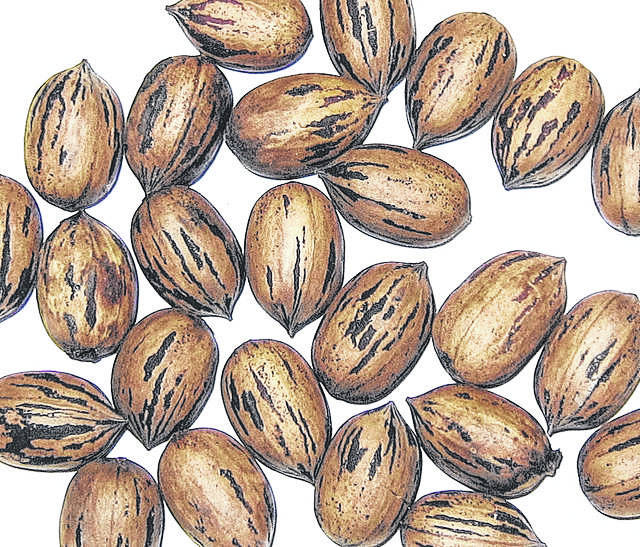LUMBERTON – The pecans that Robeson County residents buy in order to make holiday desserts will be more expensive this year, and they will likely come from California or Mexico.
Local experts and pecan buyers cannot remember a time when nearly all the pecan trees in Robeson County refused to bear nuts for one, let alone two consecutive years. They don’t have an explanation for this phenomenon, but it may be related to the recent extreme weather events.
“We didn’t have many pecans last year, and it’s worse this year,” said a cashier at Lumber River Trading Company on Roberts Avenue.
The store is selling locally grown pecans for $13.50 a pound.
Lumber River Trading pays from 70 cents to $1 for pecans and 55 cents to shell them, mainly to small pickers. Big commercial growers are rare in Robeson County, and the crop here is primarily a backyard endeavor.
Mac Johnson, a horticulturist with the Robeson County Agricultural Extension Service, could offer no explanation for the failure of the pecan crop.
“Two years in a row is unusual,” Johnson said. “Pecans bear nuts variably, but it is usually individual trees that take a year off.”
Annual demand for the healthy and flavorful nuts has grown to nearly a billion tons worldwide, and the Southeast is the No. 1 source. The Chinese have developed a taste for the nuts, and until the tariff war, were buying about 10% of U.S. pecans.
North Carolina trails several other Southern states in pecan production. However, pecan traditions are a part of local heritage.
“When I was a child, I used to pick up pecans to make Christmas money,” Johnson said. “Everybody has pecan pie on the menu during the holidays.”
In years gone by, town and country homes often had at least four pecan trees in the yard. Pecan varieties multiplied as horticulturists continued to breed larger nuts with thinner shells.
Despite falling out of fashion, there is still a local market for pecans. But Lumber River Trading Company’s cracking machines are silent this year, and the massive bags of pecans are missing.
Erica Smith, at Lumber River Trading, advises pecan growers to fertilize annually, especially after the heavy rains that may wash away essential nutrients. Smith also advises good sanitation practices by cleaning leaves, branches and undergrowth from around trees.
Like other experts, Johnson offers several possibilities for the lack of pecans.
“Scab is one of the main problems with pecans,” he said. “The hulls develop black spots and then turn all black and fall off the tree prematurely.”
After ruling out the most common pecan issues, the experts turn to the weather. A late cold snap can hurt trees early in the year, and drought can upset pollination or nut development, depending on when it occurs.
Heavy fall rain from Hurricane Matthew in 2016 and Hurricane Florence in 2018 is another possible answer to the mystery. No one has been able explain how one event caused another — excessive rain in the fall causing crop failure in future seasons.
It is a case of one extraordinary event, causing another, perhaps.
Scott Bigelow can be reached at [email protected].

